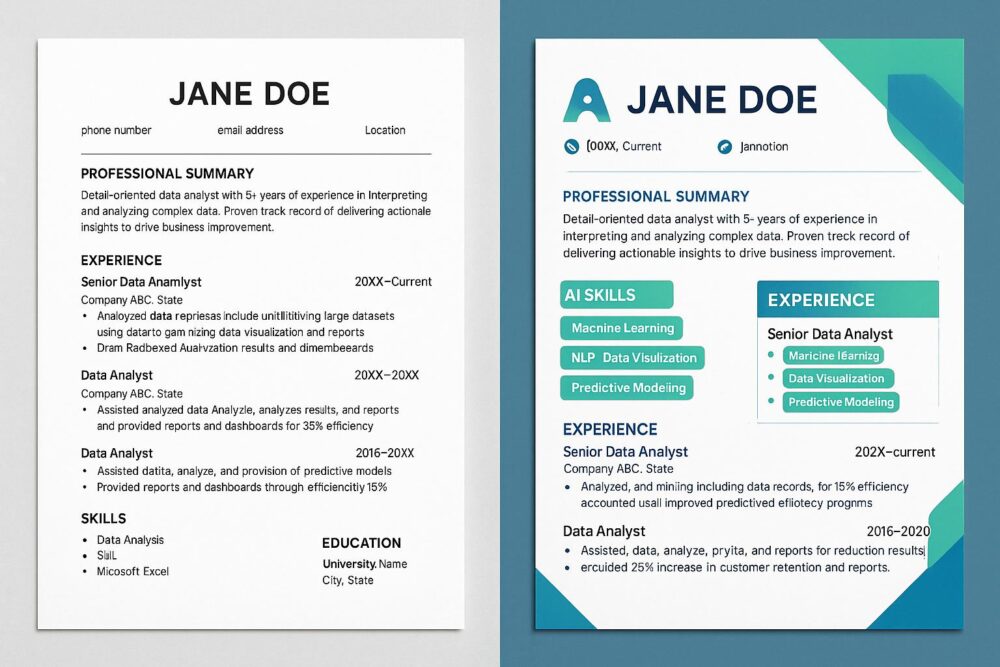How to Include AI Skills on Your Resume: In today’s competitive job market, artificial intelligence skills have become valuable assets across virtually every industry. From healthcare to finance, marketing to manufacturing, employers increasingly seek candidates who can leverage AI tools to drive efficiency and innovation. Understanding how to include AI skills on your resume effectively can significantly enhance your career prospects and set you apart from other candidates.
The key lies not just in listing AI-related technologies, but in demonstrating how you’ve applied these skills to achieve measurable results. Modern recruiters and hiring managers want to see concrete evidence of AI competency rather than generic mentions of popular tools or platforms.
How to Include AI Skills on Your Resume: Strategic Positioning of AI Skills
Technical Skills Section
How to Include AI Skills on Your Resume: The most straightforward approach to showcase AI capabilities involves creating a dedicated technical skills section. However, simply listing “ChatGPT” or “Machine Learning” without context provides little value to potential employers. Instead, organize your AI skills by category and proficiency level.
For technical roles, structure your AI skills around specific domains: Machine Learning Frameworks (TensorFlow, PyTorch, Scikit-learn), Natural Language Processing (NLTK, spaCy, Transformers), Computer Vision (OpenCV, YOLO, ResNet), and AI Development Tools (Jupyter, Docker, AWS SageMaker). Include your proficiency level—beginner, intermediate, or advanced—to set realistic expectations.
Non-technical professionals should focus on AI applications rather than underlying technologies. Categories might include Content Creation AI (ChatGPT, Claude, Jasper), Design AI (Midjourney, DALL-E, Canva AI), Analytics AI (Tableau AI, Power BI, Google Analytics Intelligence), and Productivity AI (Notion AI, Grammarly, Calendly AI).
Integration Within Experience Descriptions
How to Include AI Skills on Your Resume: The most compelling way to demonstrate how to include AI skills on your resume involves weaving AI accomplishments throughout your professional experience. Rather than relegating AI to a skills section, integrate specific examples into your job descriptions to show real-world application and impact.
For instance, instead of writing “Responsible for content creation,” enhance it to “Increased content production efficiency by 40% using AI-powered writing tools, while maintaining brand voice consistency across 50+ blog posts monthly.” This approach demonstrates both technical capability and business impact.
Sales professionals might highlight: “Improved lead qualification accuracy by 35% through implementation of AI-powered CRM analytics, resulting in 20% increase in conversion rates.” Marketing managers could note: “Launched AI-driven personalization campaign that increased email open rates by 45% and click-through rates by 30%.”
Resume examples for your Industry-Specific AI Skill Presentation

Technology Sector Applications
How to Include AI Skills on Your Resume: Tech industry candidates should emphasize both technical AI skills and practical implementation experience. Focus on specific projects, algorithms implemented, and performance improvements achieved. Quantify results wherever possible—model accuracy improvements, processing speed enhancements, or cost reductions.
Example: “Developed and deployed machine learning model for fraud detection, achieving 95% accuracy and reducing false positives by 30%, saving company $2M annually in manual review costs.” This demonstrates technical competency while highlighting business value.
Healthcare and Life Sciences
Healthcare professionals should emphasize AI applications that improve patient outcomes, streamline operations, or enhance diagnostic accuracy. Focus on compliance, data privacy, and evidence-based implementation.
Example: “Implemented AI-powered diagnostic imaging analysis tools, reducing radiologist review time by 25% while maintaining 98% diagnostic accuracy in clinical trials.” This shows both technical adoption and healthcare-specific value creation.
Finance and Banking
Financial services professionals should highlight AI applications in risk management, fraud detection, algorithmic trading, and customer service enhancement. Emphasize regulatory compliance and quantifiable risk reduction.
Example: “Deployed AI-driven risk assessment models that improved loan approval accuracy by 22% while reducing processing time from 5 days to 2 hours, enhancing customer satisfaction scores by 15%.”
Marketing and Communications
Marketing professionals should focus on AI tools that enhance campaign performance, customer insights, and content creation efficiency. Emphasize creativity augmentation rather than replacement.
Example: “Leveraged AI content generation tools to increase blog publishing frequency by 300% while maintaining SEO ranking improvements of 25% across target keywords, driving 40% increase in organic traffic.”
Common Mistakes to Avoid
Overstating Capabilities
How to Include AI Skills on Your Resume: One critical error when learning how to include AI skills on resume involves exaggerating proficiency levels. Claiming expert-level knowledge in complex AI domains without substantial experience can backfire during technical interviews. Be honest about your skill level and focus on continuous learning trajectory.
Generic Tool Listing
Simply listing popular AI tools without context provides minimal value. Instead of writing “Familiar with ChatGPT,” specify “Utilized ChatGPT for customer service automation, reducing response time by 50% and improving customer satisfaction scores by 20%.”
Ignoring Industry Relevance
Different industries value different AI applications. Research your target industry’s AI adoption trends and emphasize relevant skills. A retail professional should highlight AI in inventory management and customer personalization rather than medical diagnosis applications.
Certifications and Continuous Learning

Professional Certifications
How to Include AI Skills on Your Resume: Include relevant AI certifications to validate your skills and demonstrate commitment to professional development. Popular certifications include Google AI Platform, AWS Machine Learning Specialty, Microsoft Azure AI Engineer, and IBM AI Engineering Professional Certificate.
List certifications with completion dates and issuing organizations. For example: “Google Cloud Professional Machine Learning Engineer (2024)” or “AWS Certified Machine Learning – Specialty (2024).”
Online Learning Platforms
Mention completed courses from reputable platforms like Coursera, edX, Udacity, or LinkedIn Learning. Focus on courses that directly relate to your target role and include completion certificates when available.
Project Portfolio
How to Include AI Skills on Your Resume: Consider creating a portfolio section highlighting AI projects you’ve completed. Include brief descriptions, technologies used, and measurable outcomes. This approach works particularly well for technical roles where hands-on experience demonstration is crucial.
Tailoring AI Skills for Specific Roles
Entry-Level Positions
AI skills to add: For entry-level candidates, emphasize AI learning initiatives, academic projects, and practical experimentation. Focus on foundational understanding and enthusiasm for AI adoption rather than advanced expertise.
Examples for your resume: “Completed 40-hour machine learning specialization course and implemented three practice projects using Python and TensorFlow, demonstrating proficiency in data preprocessing, model training, and performance evaluation.”
Mid-Level Management
Mid-level professionals should emphasize AI strategy, team leadership in AI adoption, and cross-functional collaboration. Highlight how you’ve guided AI implementation across teams or departments.
Example: “Led cross-functional team of 12 professionals in implementing AI-powered customer service chatbot, reducing support ticket volume by 35% and improving first-response resolution rates by 50%.”
Senior Executive Roles
How to Include AI Skills on Your Resume: Senior executives should focus on AI strategic vision, organizational transformation, and competitive advantage creation. Emphasize how AI initiatives have driven business growth, operational efficiency, or market positioning.
Example: “Spearheaded company-wide AI transformation initiative, resulting in 20% operational cost reduction and 15% revenue increase through improved customer personalization and predictive analytics implementation.”
Future-Proofing Your AI Resume

How to Include AI Skills on Your Resume: As AI technology continues evolving rapidly, maintaining current and relevant skills becomes crucial. Regularly update your resume to reflect new AI tools, techniques, and accomplishments. Subscribe to industry publications, participate in AI communities, and pursue continuous learning opportunities.
Consider how to include AI skills on resume as an ongoing process rather than a one-time task. The AI landscape changes quickly, and staying current with emerging trends, tools, and best practices ensures your resume remains competitive in an evolving job market.
How to Include AI Skills on Your Resume: Remember that successful AI skill presentation combines technical capability with business impact. Employers want to see how AI skills translate into measurable value creation, operational efficiency, or competitive advantage. Focus on storytelling that demonstrates both technical competency and practical application in real-world business scenarios.

